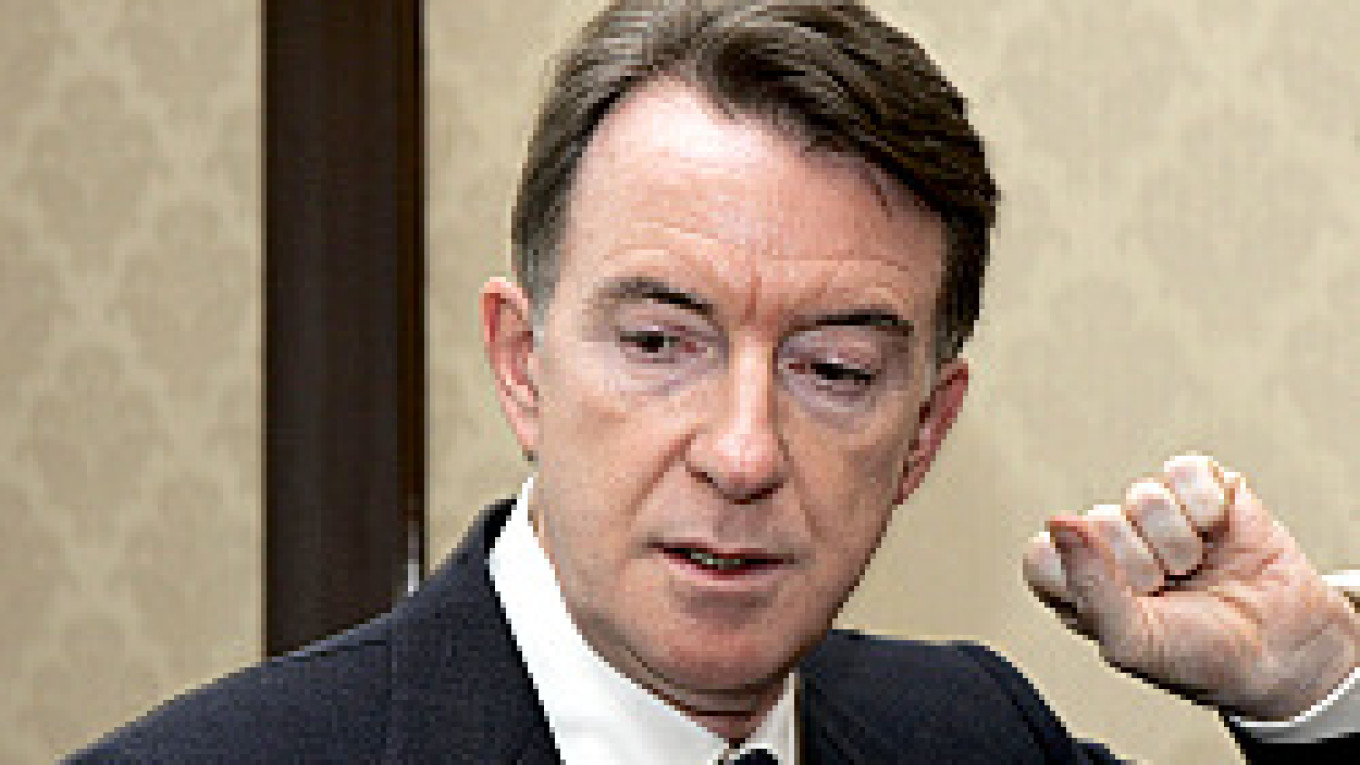"This is not affecting the atmosphere surrounding the run-up to the summit," EU Trade Commissioner Peter Mandelson said in an interview.
Lithuania has angered Russia by proposing a bill that would prohibit the public from displaying Soviet symbols, including the red flag with a hammer and sickle and the national anthem.
The Baltic country moved to the fore of EU member states taking a resistant stance against Moscow when it threatened to veto the start of already long-delayed talks on a new cooperation agreement this spring.
Vilnius dropped the threat, however, after winning assurances that its demands would be considered during the talks, which are now scheduled to open on Thursday at the summit in the Siberian city of Khanty-Mansiisk.
Mandelson said he hoped the meeting would become a turning point for ties with Moscow. "We have a new government ... combining two big personalities and many talents, and it is time to move on to a new chapter in our relations," he said.
The commissioner was speaking on the sidelines of an international relations conference organized by the Alfred Herrhausen Society, the international forum of Deutsche Bank.
And while he praised Russia's macroeconomic polices as "prudent" and tried to ease political tensions, Mandelson also stressed that structural problems remained.
"Russia is creating industrial giants, but only in a handful of product sectors. The manufacturing and service base remains far too narrow," he said in an address to the conference, adding that investment in infrastructure was too weak and that education and science were underfunded.
"Russia has to avoid becoming trapped in the false strength of a petro-state," he said.
Mandelson also criticized what he called energy suspicions, saying "each suspects the other of employing double standards, of using the energy weapon as an instrument of politics."
He also argued that business was a better tool than politics to mend relations. "In the end, it is probably the businessmen and entrepreneurs, and civil society -- not the diplomats, ministers or commissioners -- who will ensure that Russia and the EU converge economically and politically," Mandelson said.
Nonetheless, he said in the interview, both sides must make an effort to get past the string of disputes that brought about a sharp deterioration of Russian-European relations last year.
"We've got to engage in more mutual respect and less mutual suspicion. For that, we need to build trust on both sides. There has been a trust deficit in this relationship."
But he also made it clear that he expected the negotiations for the new cooperation agreement to last well beyond 2009, calling it "too big an undertaking."
Mandelson is in Moscow for two days of talks on preparations for the Khanty-Mansiisk summit and Russia's accession to the World Trade Organization.
Membership in the global trade body, he said, would serve as a springboard for mutual preferential treatment in trade and investment.
But he reiterated Brussels' argument that outstanding trade disputes would have to be solved before the EU would agree to have Russia in the WTO.
The most serious conflict regards export duties for wood, which Brussels says have been ratcheted up by Moscow in breach of an earlier agreement.
"Given letter and spirit of our 2004 agreement, we cannot accept such draconian measures ... that pose a direct threat to European industry," he said.
Mandelson said he hoped that the issue would be solved by the end of this year and that Russia's WTO membership could be ratified in 2009. "If there is a compromise to be found here, it will be by the end of the year," he said.
But "politicization of our differences" has repeatedly prevented both sides from thinking clearly about the strategic importance of our common interests, he warned in his address.
Mandelson -- a member of the British Labour Party and close ally of former Prime Minister Tony Blair, serving twice in his Cabinet -- also pleaded for more European unity.
By thinking in terms of national advantage, the EU risked defeating itself, he warned. As an integrated economy, the union needs to engage Moscow with one voice, he said.
"Russia should see this as an opportunity. It is in Russia's strategic interests that we work together," he said.
A Message from The Moscow Times:
Dear readers,
We are facing unprecedented challenges. Russia's Prosecutor General's Office has designated The Moscow Times as an "undesirable" organization, criminalizing our work and putting our staff at risk of prosecution. This follows our earlier unjust labeling as a "foreign agent."
These actions are direct attempts to silence independent journalism in Russia. The authorities claim our work "discredits the decisions of the Russian leadership." We see things differently: we strive to provide accurate, unbiased reporting on Russia.
We, the journalists of The Moscow Times, refuse to be silenced. But to continue our work, we need your help.
Your support, no matter how small, makes a world of difference. If you can, please support us monthly starting from just $2. It's quick to set up, and every contribution makes a significant impact.
By supporting The Moscow Times, you're defending open, independent journalism in the face of repression. Thank you for standing with us.
Remind me later.


